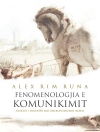What makes up a public, what governs dominant discourses, and in which ways can counterpublics be created through narrative? This edited collection brings together essays on affect and narrative theory with a focus on the topics of gender and sexuality. It explores the power of narrative in literature, film, art, performance, and mass media, the construction of subjectivities of gender and sexuality, and the role of affect in times of crisis. By combining theoretical, literary, and analytical texts, the contributors offer methodological impulses and reflect on the possibilities and limitations of affect theory in cultural studies.
Bu e-kitabı satın alın ve 1 tane daha ÜCRETSİZ kazanın!
Dil İngilizce ● Biçim PDF ● Sayfalar 238 ● ISBN 9783839461419 ● Dosya boyutu 3.8 MB ● Editör Silvia Schultermandl & Jana Aresin ● Yayımcı transcript Verlag ● Yayınlanan 2022 ● Baskı 1 ● İndirilebilir 24 aylar ● Döviz EUR ● Kimlik 8217172 ● Kopya koruma Sosyal DRM












